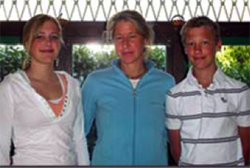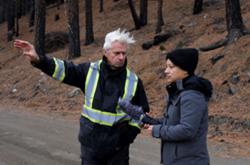
Amy Robertson, by most conventional standards, lives a healthy lifestyle. She eats locally grown organic food and doesn't smoke. She and her family ride their bikes, use transit and make frequent use of the green space in their neighbourhood. As the original co-owner of Glen Valley organic farm, along with her partner Gregor Robertson (MLA for Vancouver-Fairview), co-founder of Happy Planet and member of the board of Your Local Farmer's Market Society in Vancouver, she is probably more aware than most about how to live a sustainable and healthful life.
So why does a new report show that her body contains high levels of heavy metals, as compared to fellow Canadians also tested?
And why do her teenage children's samples contain PCBs, a substance whose manufacture and import has been banned in North America since 1977?
British Columbia prides itself on its green image and in its citizens' active, healthy lifestyles. Consumption of local organic food is on the rise and people are turning towards non-toxic products for use in their homes. And yet, according to Polluted Children, Toxic Nation: a Report on Pollution in Canadian Families, released today by the Environmental Defence, residents continue to absorb toxic elements from the environment. The report raises questions as to how far an individual's choices can go to mitigate exposure to toxins, when PCBs, heavy metals and brominated flame-retardants, amongst others, respect no state or provincial boundaries.
Robertson and two of her children, Johanna (15) and Satchel (13), are British Columbia's participants in the EDF's Toxic Nation project, whose goal is to determine the real state of our environmental health by looking closely at the substances that bioaccumulate in our bodies.
'Really disappointing'
As with the first Toxic Nation report, a diverse, Canada-wide cross-section of volunteers had their blood and urine analyzed by the Centre for Toxicology at the Institut National de Santé Publique du Québec (Ste Foy) and AXYS Analytical Services (Sidney) to determine the presence of 68 specific toxins. The difference with this round of testing is that children, like Johanna and Satchel, have been included in the study for the first time.
Participants answered a lifestyle questionnaire to determine the factors that might contribute to the presence of toxins in their blood and urine samples. They were asked to describe their diets, their use or exposure to pesticides, the amount of time spent in malaria-affected countries where DDT is used to control mosquito populations, and state whether or not they smoke.
The Robertsons, with their active lives and healthy diets, were surprised to find that their results revealed some of the highest concentrations of toxins in the study. And Robertson and her two children were the only family tested to show higher concentrations of PCBs in the children than in the parent. The daughter's total concentration of PCBs (measured in micrograms per litre, equivalent to parts per billion) was 1.104, the son's was 1.041, and Amy's was 0.888 -- while the median total concentration in all volunteers was 1.041. PCBs are a known carcinogen, and can cause birth defects, as well as damage the immune, cardiovascular and nervous system. Amy Robertson describes the outcome of the tests as "really disappointing, and that might be saying it lightly."
Lab analysis shows the presence of 32 out of 68 toxins in Johanna's samples, the highest of all children tested. Satchel and Johanna were also found to have higher than average levels of organochlorine pesticides, as compared to the other children in the study. Samples showed the presence of 24 carcinogens in mother and son, while 26 were found in the daughter. Robertson's tests also revealed the highest level of arsenic in the study population (56 nanomoles per litre).
According to the report, the level of a substance present in someone's sample cannot predict the effects it will have on that person's health. Little is known about the cumulative effects of exposure, even at low doses, to a variety of chemicals. Toxic Nation makes the point that "as a result, Canadians are the test subjects in an uncontrolled experiment on the effects of daily exposure to a multitude of harmful toxic chemicals."
Pointing fingers
What's to blame? Robertson wonders if growing up in Michigan, an area known for its auto manufacturing industry, could have led to some of her exposure and whether she passed on those PCBs to her children through breastmilk. Perhaps the fish they ate while living in the Gulf Islands contributed heavy metals to their systems, though Robertson doesn't want to point fingers, saying it's "certainly not the fault of the fishermen that the fish have mercury in them."
The Toxic Nation website features a chemical reduction pledge that provides suggestions for detoxifying the home and garden. It lists alternatives to products containing flame retardants, pesticides and other known carcinogens. And the site also features Food Watch, a section on ways of reducing toxin intake through food. However, as Robertson's experience makes clear, individual lifestyle choices are not enough to keep harmful substances -- present in the air, the water and the food system -- out of one's body.
Toxic Nation is just a small sampling of the Canadian population, and further studies are clearly needed -- the report notes that the sampling was not randomized and not large enough to produce an accurate statistical picture. But the fact that the study found known carcinogens in every family surveyed, regardless of location and background, is consistent with the findings of larger studies conducted in the U.S. and Europe, states the EDF. According to the Canadian Cancer Society, one of every 2.3 men and one of every 2.6 women in Canada will develop cancer at some point in their lifetime, which raises questions about the presence of known carcinogens in the body at any concentration.
Amy Robertson hopes her results will encourage others to get tested and to push for the government to take action. While she is learning more about the various toxins found in her family's samples, and is searching for detoxification methods, she emphasizes that lifestyle choices and living in a health-conscious region aren't enough to keep us free of carcinogens.
"We just can't isolate ourselves and say B.C. is green and we're healthy because of this. It's a worldwide problem," says Robertson. "Nobody's immune."
Lisa Hale is a freelance writer in Vancouver. ![]()















Tyee Commenting Guidelines
Comments that violate guidelines risk being deleted, and violations may result in a temporary or permanent user ban. Maintain the spirit of good conversation to stay in the discussion.
*Please note The Tyee is not a forum for spreading misinformation about COVID-19, denying its existence or minimizing its risk to public health.
Do:
Do not: